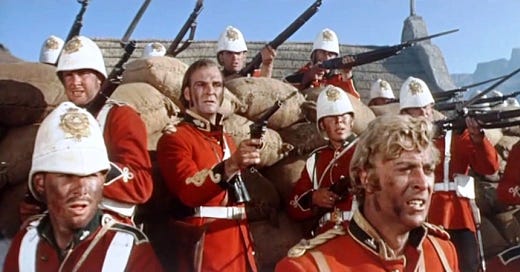Michael Caine, Stanley Baker and others about the inflict the opposite of Christmas cheer in Zulu.
Life here on France’s Atlantic Coast is gradually returning to normal. The gifts have been stowed, the remains of Christmas dinner’s roast piglet inventively employed for snacks and stir-fries, and the masses of crumpled wrapping paper employed to light the log fires that cheer our evenings.
Not all my Christmases have been so cheerful.
For some years, I lived with my ex-wife, an American, in north London. We’d made a conscious decision to distance ourselves from our roots and assumed our single or childless neighbours felt the same. By Christmas Eve, however, their apartments were empty, and cars that had remained immobile all year - even ancient bangers which, from the evidence of accumulated grime, dead leaves and bird droppings, were embedded in the asphalt – had been coaxed into one last trip back home.
One year, hoping to prove that a happy but non-family Christmas was possible, we invited to lunch a dozen friends who, like us, were alone in London. The meal was cheerful enough, and we settled down to watch the traditional afternoon movie epic on TV – on this occasion that account of British colonial slaughter, Zulu. By the fade, however, even the effect of lunch had worn off. Those not asleep slouched in their chairs, staring in silence at the walls as night drew on and dead leaves blew along the empty streets.
On another Christmas, we found ourselves in Detroit, at the invitation of Barney, a fellow scholar who’d married one of his students, abandoning a wife and two small children to do so.
“It’ll be great!” he told me over the phone. “Sharon is letting us have my kids for Christmas. We’ve got a tree - and Jenny’s bought a turkey.”
My wife grimaced, and mouthed silently “Detroit?” But Barney was a friend, our own families were far away, and the thought of sharing his pleasure was infectious.
Christmas Eve dawned stormy. Cold fronts marched across the eastern seaboard, periodically paralysing already overstretched airlines. At Dulles Airport, controllers slipped our flight in between two storm cells. A roiling bank of steel-grey cloud pursued us as we blasted off, cheered by twenty drunken African-American doctors who’d seized business class and, even as turbulence shook open the luggage lockers, refused to sit down.
By the time we reached Detroit, the storm had become a blizzard, and flights were grounded across the country. We reached Barney’s apartment to find him desperately calling his ex-wife, begging her to ignore the weather and put his kids on a plane. By nightfall, it was clear that, sensibly, she wasn’t about to do so.
For Barney, the holidays ended then. Inconsolable, he wandered the apartment, staring out at the horizontal snow and muttering, “Christmas is nothing without kids.”.
Hoping to lighten the mood, Jenny suggested we see a film, Barney sullenly acquiesced, and we crept out into the gelid night. A few blocks away, as we paused at an intersection, a battered car without lights or muffler, and sagging to one side on ruined suspension, roared out of the dark and, engine screaming, plunged across our path. A twisted fender caught the asphalt, spitting sparks. We stared after it, open-mouthed. If Detroit had an Angel of Death, this surely was his chariot.
Next morning, the lights on the tree remained unlit, the gifts unopened, the turkey uncooked. By mid-day, the snow had passed but not the wind that drove it. Since nobody felt like cooking, we descended into the Arctic cold and trudged to a deli for a pastrami sandwich on rye, with a pickle, and a slice of pie.
Returning to the chill apartment, Joe offered to run a film from his large collection.
“How about It’s a Wonderful Life?” he suggested. But the thought of Jimmy Stewart oozing Christmas goodwill made the pastrami turn over uneasily in my stomach.
“I don’t suppose you’ve got Zulu?” I asked.





Nothing dull or boring about your Christmases.:))
Well at least you were there with your friend😏